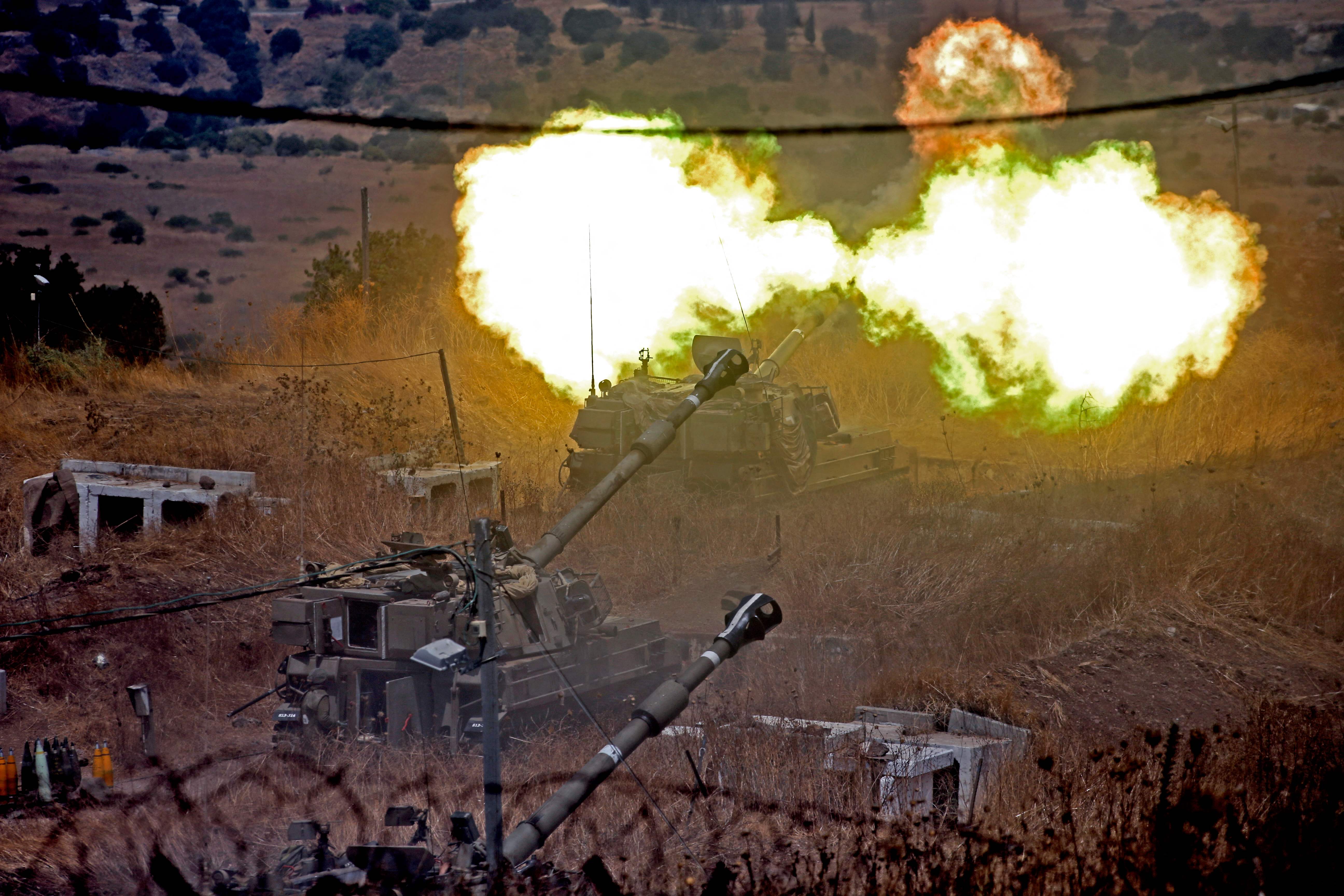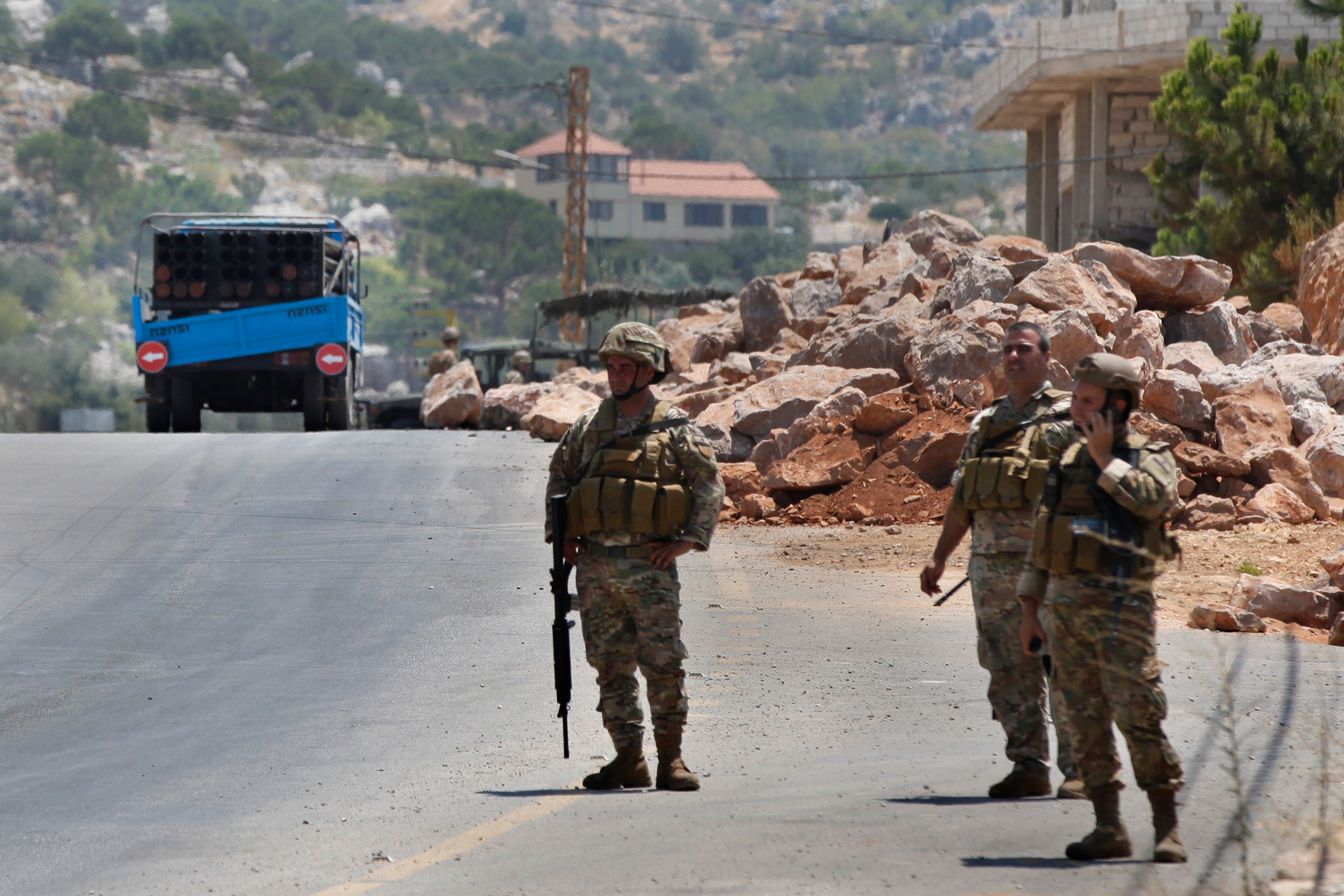Hezbollah fires rockets after Israeli artillery strikes
Lebanese citizens turned their fury on Hezbollah militia after missile strikes on Israel

Your support helps us to tell the story
From reproductive rights to climate change to Big Tech, The Independent is on the ground when the story is developing. Whether it's investigating the financials of Elon Musk's pro-Trump PAC or producing our latest documentary, 'The A Word', which shines a light on the American women fighting for reproductive rights, we know how important it is to parse out the facts from the messaging.
At such a critical moment in US history, we need reporters on the ground. Your donation allows us to keep sending journalists to speak to both sides of the story.
The Independent is trusted by Americans across the entire political spectrum. And unlike many other quality news outlets, we choose not to lock Americans out of our reporting and analysis with paywalls. We believe quality journalism should be available to everyone, paid for by those who can afford it.
Your support makes all the difference.Hezbollah says it has fired “dozens” of rockets at Israel in retaliation for airstrikes, believed to be the first on Lebanon in seven years, as tensions along the border mounted.
The Iranian-backed Lebanese militant group said it hit “open fields” near Israeli positions in the disputed Shebaa farms area with “dozens” of rockets. No casualties were reported.
Israel’s army spokesperson, Amnon Shefler, said 19 rockets had been fired from Lebanon by Hezbollah, with “16 landing in Israel”. He added that 10 had been intercepted by the defence system known as the Iron Dome, and three of the rockets landed in Lebanon.
The United Nations Interim Force in Lebanon (Unifil), meanwhile, urged both sides to immediately back down saying it was “dangerous”.
“Unifil has detected rocket launches from Lebanon and return artillery fire by Israel. This is a very serious situation and we urge all parties to cease fire,” it wrote on Twitter.
It later said it was coordinating with the Lebanese army to strengthen security measures and said it was actively engaging with all sides “to prevent the situation from spiralling out of control”.
Israel’s army confirmed it was using artillery to fire back at Lebanon and said it was prepared for any eventuality.
“We believe that Hezbollah does not want a full-out war,” said Shefler, adding that neither did Israel, but that the country was “prepared to defend its civilians”.
He added that he believed Hezbollah was carrying out attacks now to show “it controls southern Lebanon”.
Lebanese media outlets later reported that Hezbollah said its fighters were confronted by angry residents in the south of the country after returning from firing rockets across the border. L’Orient Today said videos circulated online showed furious citizens trying to intercept a truck bearing a missile platform.
Saad Hariri, a prominent Sunni Muslim politician and former prime minister designate, tweeted that using the south as a “platform for regional conflicts... is very, very dangerous” as it has “uncalculated results” and “puts Lebanon in the crosshairs of the wars of others”.
Shebaa Farms is an Israeli-occupied enclave where the borders of Israel, Lebanon and Syria meet. Israel says it is part of the Golan Heights, which it captured from Syria in 1967. Lebanon say it belongs to Lebanon, while the United Nations says it is Syrian territory and that Damascus and Israel should negotiate its fate.
Hezbollah-linked Manar TV says Israeli warplanes are flying at low-altitude over southeast Lebanon.
Sirens wailed in the north of the country on Friday as video footage showed nearly a dozen rockets streaming through the sky, and the Iron Dome deploying its interceptors.
It came just a day after Israel said its fighter jets struck sites and infrastructure following an earlier barrage of rockets. The Israelis say this is the first time since 2014 that Israeli warplanes have struck inside Lebanon.
“The Israeli army views the State of Lebanon as responsible for all actions originating in its territory,” the army said. “It warns against further attempts to harm Israeli civilians and Israel’s sovereignty.”
Lebanese President Michel Aoun said Israel’s use of its air force to target Lebanese villages "is the first of its kind since 2006 and indicated the presence of aggressive, escalatory intentions" against Lebanon. In a statement, he said Lebanon would submit a complaint to the United Nations.
The commander of the UN peacekeeping force in Lebanon, Stefano Del Col, on Thursday called on the parties “to act with urgency” to de-escalate tensions and prevent violations of the cessation of hostilities that has been in effect since 2006.

It marked a major escalation at a difficult time for both sides. Lebanon is currently in the grip of one of the world’s worst economic collapses, caused by decades of chronic mismanagement and corruption.
The currency has lost over 90 per cent of its value, prices have quintupled and electricity shortages have meant households are only getting a few hours of power a day.
Thousands took to the streets on Wednesday, the day before the strikes, to demand accountability for a massive explosion which rocked Beirut exactly a year ago, killing 200 people. At the rallies, protesters also demanded regime change.
It’s also tricky timing for Israel, whose new ruling coalition of far right, leftist and Arab parties is trying to keep peace under a fragile ceasefire that ended an 11-day war with Hamas’ militant rulers in Gaza in May.
Several incidents leading up to this week’s rocket fire from Lebanon have focused attention on Israel’s northern border. The United States swiftly condemned the attacks on Israel.
Join our commenting forum
Join thought-provoking conversations, follow other Independent readers and see their replies
Comments